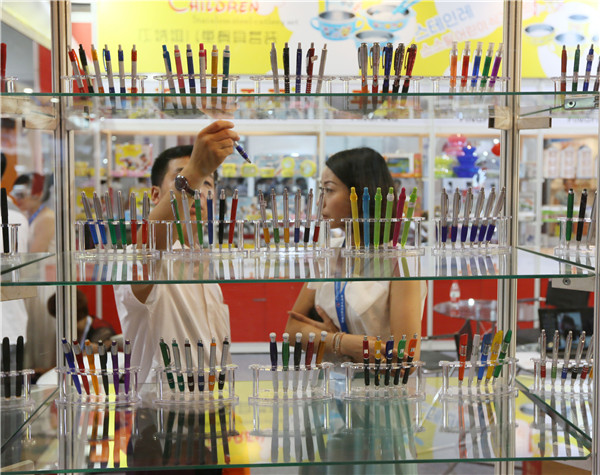 |
|
Customers pick pens at an international gift fair in Beijing. A JING/CHINA DAILY |
Flourishing Italian premium stationery firms go high-tech and expand in China
At a time when electronic forms of communication are taking over, the number of premium stationery boutiques is growing in China, catering to those consumers looking for sophisticated products that spell tradition and refinement.
The transformation of stationery products from practical tools to lifestyle accessories is opening up a new world of opportunity for high-end foreign stationery firms in China.
For instance, Campo Marzio, which started as a small family-owned leather goods shop in central Rome in 1933, is now known for its soft Italian leatherette business accessories in bold colors and sophisticated writing instruments with scented inks.
The Italian stationer entered China in 2005 with a flagship store and an office in Hong Kong.
 |
|
A Moleskine daily diary and a high-end ballpoint pen in use.GETTY IMAGES |
"If ten years ago someone had told me we would have a great experience in China, I wouldn't have believed it," explained Roberto Di Giorgio, managing director of Campo Marzio. "However, in the last 10 years, China has become our priority market."
Last year, the premium stationer registered annual retail sales of 30 million yuan ($4.6 million), reflecting a strong appetite for the brand in the country.
Campo Marzio, which already has 20 stores in China's largest cities like Beijing, Shanghai and Xi'an expects to open this year an additional 20 retail stores and special boutique kiosks across China.
The expansion of its brick-and-mortar stores will be complemented by an online store to be launched in September, a strategy that is expected to increase the company's sales in China by 30 percent this year.
For Di Giorgio, the success of the brand in China reflects that Chinese consumers are becoming less brand-conscious and are opting for craft products with a personal touch instead.
"China is a very special market because clients want very high-quality products with a unique design," explained Di Giorgio. "Chinese love culture and calligraphy. China is one of the few places in the world where fountain pens sell better than ballpoint and roller pens, which means that Chinese know the pleasures of writing."
Nonetheless, because high-end stationery firms are aware that the use of electronic media is affecting the way we communicate and the writing materials we use, Campo Marzio will introduce a new line of pens that can be used to both write on paper and to register messages on a computer or smartphone, allowing users to always have a digital and a physical copy of their writing.
The introduction of technology settings is one of the reasons why the company will soon relocate its Asia office from Hong Kong to Shenzhen, one of China's busiest technology hubs.
Even though imported stationery remains a niche market, representing just 3 percent of the total domestic demand of $11.6 billion, premium products have a loyal clientele among Chinese consumers.
Imports of stationery products reached $352.7 million in 2015, helped by the use of technological advantages and solid brand reputation, according to a market report by business intelligence firm IBIS World.
"As most domestic companies in the industry operate as manufacturers rather than brand-holders, the Chinese market is still reliant on imports of high-end products," wrote IBIS.
Imports of stationery products are forecast to grow to $384.5 million in 2020, as more leading foreign enterprises will enter the Chinese market over the next five years.
Milan-listed Moleskine Spa came into being in 1997 with the idea of reviving the style of the iconic pocket-size black notebooks used by legendary artists and thinkers like the US writer Ernest Hemingway and Spanish painter Pablo Picasso.
In early 2013, the Italian company opened its first Chinese store in Shanghai and in a period of just two years, the brand inaugurated 21 directly operated stores across the country, with a flagship store in central Beijing.
"The brand has been enjoying a growing popularity in China ever since we opened in Shanghai," explained Moleskine CEO Arrigo Berni.
Given the high demand for premium stationery products, Moleskinew expects to open six new stores in China this year.
Last year, the company generated revenues of 23.06 million euros ($26.12 million) in the Asia Pacific region, a 64 percent growth on the year, thanks to continued retail expansion.
"In China, there's a natural passion for writing and writing instruments, which stems from its rich and ancient writing civilization," said Berni.
Moleskine notes that writing instruments, particularly pens and pencils, limited-edition notebook collections dedicated to the literary icon The Little Prince, and cartoon character Doraemon are among the most popular items in China.
As technology evolves towards a paperless world of electronic devices, the brand is also improving its products.
Moleskine has been recently focusing on digital services, particularly in developing applications for smartphones and tablets.
"We never believed in competition between paper and technology. Our brand actually grew up in the digital era," added Berni. "A study showed that more than 60 percent of people now use both notebooks and digital devices to write."
